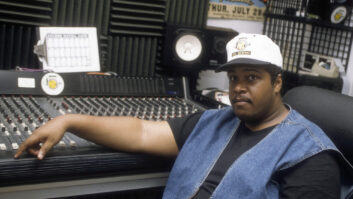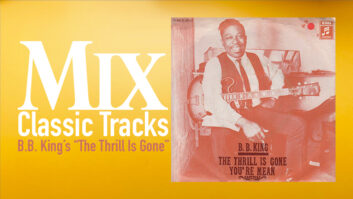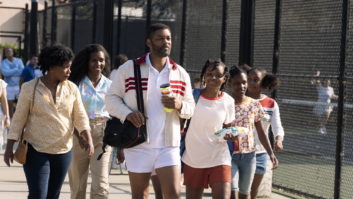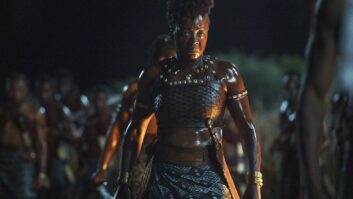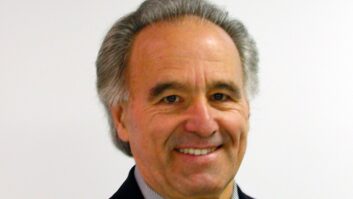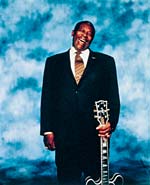
If 2003 was “The Year of the Blues,” it’s appropriatethat the undisputed modern master of the genre, B.B. King, put out afine album in the fall to cap the celebration. King has beenenthralling audiences and listeners with his distinctive vocals,ripping guitar work and captivating storytelling since the 1940s. Hiscareer has reached a pinnacle that few have achieved, particularly inblues. With dignity, perseverance, optimism and an occasional spot ofgood fortune, King has definitely paid his dues to become one of themost respected performers in the music industry.
Most amazingly, at 78, the veteran bluesman doesn’t understand theconcept of slowing down or resting on his laurels. Instead, his is arich life of relentless touring, recording sessions and vigilantadministration of his business enterprises. He’s made more than 100albums in nearly every setting imaginable and touching on many, manygenres — from the twist to jazz — yet until recently, he’dnever devoted an entire project to one of his greatest strengths:ballads. Now he has. With the mellow Reflections album, King hasfulfilled a long-held dream.
“I’ve wanted to do it, but I never do more than a fewballads,” he says, “so I thought it might be good to try awhole CD for once and see if people would like it. Two of the songs— ‘Tomorrow Night’ and ‘A Mother’s Love’— I think I did years ago, but nothing like what we did on thisrecord.”
King’s supporting cast for the album are all versatile players,including keyboardists Joe Sample (of the Jazz Crusaders fame) and TimCarmon, bassist Nathan East, drummer Abe Laboriel Jr. and guitaristDoyle Bramhall II. All of them, along with additional symphonic touchesadded later by Nick Ingman, were employed under the guidance of SimonClimie, a regular Eric Clapton collaborator. Not coincidentally, thisis some of the same cast that made Clapton and King’s acclaimedRiding With the King CD, recorded in 2000.
“I think B.B. has always wanted to do this [kind of album] andwasn’t sure if his record company would go for it because he’s a bluesguy,” comments producer Climie from a studio in London where hewas working on Clapton’s upcoming record. “But the thing abouthim is that he’s one of those singers that just makes the words come tolife. Even with a great song you’ve heard so many times that you’rereally not even listening anymore, somehow when he delivers it, it’stotally unconditional.”
“Having over 50 years in the business,” King adds,“I’ve heard many songs that I would like to do. Sometimes I thinkI like them because of the person that did them prior to me was so goodwith them. And in my case, after you try them, they don’t sound toogood [Laughs]. One of my favorites is ‘Always on My Mind,’but I can’t do it like Willie Nelson does.” Nat King Cole wasanother King favorite that he wouldn’t have dreamed of trying his songsearlier in his career. But early on, King and Climie decided not tolimit the scope of the ballads on Reflections. According to theproducer, the initial list for the project encompassed 2,500 songs,which King and Climie first whittled down to just 60. Twenty wererecorded and eventually 13 were selected.
The tracking sessions for Reflections took place at RecordOne in Los Angeles — the same facility used for Riding Withthe King — 10 days before Christmas in 2002. Since his firstrecording dates in the 1940s, King’s sessions have always been aboutperformance above all; he likes to get in there with the whole groupand lay it down live as much as possible. “It’s always fun for meto see what everyone else is doing and be able to feel them,”King says. “I do a better job then.”
“B.B.’s approach to recording is, ‘Here Iam,’” Climie says, “so we just went through it, trackby track. He did his thing and that’s what it was, and when it wasgreat, he just moved on and didn’t question it. There are a lot ofpeople who like the rather more indulgent recording process where youtry every possibility. And I do those types of records, too. It justdepends on what kind of thing you’re doing. With B.B., it’s a totallyemotionally driven thing. He loves the feeling in a song, and we spentmore time focusing everyone, changing the key and working on tempo.Suddenly, you’d get this incredible performance and you have to be in‘record.’ If you missed it, you wouldn’t get itagain.”
However, like most modern mortals, King does vocal and guitaroverdubs when needed. King insists that he’s not very technical andleaves matters pertaining to technology and sonics to his engineers andproducers. Instead, he says, “I study the guitar.” Still,Climie notes, “You’d be surprised. He came in at the beginning ofthe album with a lot of his favorite songs all on an MP3 player withall the lyrics. And he’s got kind of a Palm Pilot thing that connectsto the Internet when he’s on the road. He’d come over when we weresequencing and ask if it was Cubase or Logic Audio we were using. We’dbe scratching our heads thinking, ‘Surely he’s not asking usthat.’ But he is. Watch out for him!”
Engineer Don Murray enjoyed King’s inquisitiveness while keeping awatchful set of eyes and ears on the technical aspects of the trackingand vocal sessions. He recorded the project to Pro Tools|HD, which heterms “a great system. Now I’m exclusively working and mixing onit.”
The Los Angeles — based engineer had worked with King backaround 1974, when Murray was an assistant engineer at Sigma Sound inPhiladelphia. Both he and King were fuzzy about the exact recording anddate, but nevertheless, had fun reminiscing about the old days. Murrayand Climie have now been working together for a little more than ayear, doing a Michael McDonald project and a single that Eric Claptonrecorded for a Motown tribute to Stevie Wonder. Murray says that he wasgreatly impressed by King’s endearing personality and vitality.
“He would sing [live] all day long and just not loseenergy,” Murray recalls. “I guess he’s used to it becausehe’s on the road a lot. He didn’t really play guitar live; he did thatlater as overdubs. He really wanted to concentrate on his vocals and weset a mic [a Sony C12] in the studio with the rhythm section. There wasno isolation. He was in the middle of the band, literally 10 feet fromthe drums [which were screened off]. It produced a nice ambient soundthat went well for this record. For this type of music and for B.B., Ithink it’s more exciting to hear the songs as if you were in a club,rather than having everything isolated and pristine. I also set up acouple of room mics [also C12s] to capture even more ambience.”Murray also used C12s for piano, while he employed Neumann U67 tubes orShure SM57s for guitars, and Neumann U67s for the Hammond B3.
“I try to use the best-quality equipment I can going into ProTools,” the engineer says. “With an SSL 9000 formonitoring, I used Neve 1073s, 1081s with EQ on them, the Avalon stuff,API and Tube-Tech. Also, I used Teletronix LA-2As and dbx gear forcompression, along with Pultecs and LA-2As on B.B.’s and Doyle’sguitar.” As would be expected, King doesn’t care for any effectsadded to his guitar, “Lucille.” “One CD yearsago,” he remembers, “I used something called a Cry-Baby,but since then, I never have used anything else on my guitar. It seemedlike it made things sound so good, it was like cheating.”
Once all of the tracking and overdub sessions were completed, Climiereviewed the tracks and did preliminary edits. From there, he went toLondon and worked with an arranger to record accompanyingorchestration. Then, several months later, renowned mixer MickGuzauski, who also worked on Riding With the King, worked withClimie to fuse the vocal and band tracks with the strings and brassinto the soothing finished selections. “I would usually mix twoto three tracks a day,” Guzauski recalls. “Then Simon wouldcome in and we’d work on them together. He’d make comments and look atnotes he got from B.B. and then we would do it again. Sometimes, Simonwould do some editing after he heard the first mix. I love working likethat, because everybody has their input and nobody gets burned out fromworking really, really long hours on one thing.”
In the end, everyone involved with Reflections — fromthe musicians to the tech team — seemed to be satisfied with thefinished album, yet another landmark in a career filled with them.Climie speaks for many when he notes, “It’s a real joy to workwith B.B., and kind of educational at the same time. There’s not a lotof phenomenal music around at the moment, and we did get to choose fromthe best songs in the last 50 years. That’s got to be a greatinspiration for anyone.”
But King is still looking forward: “I still have a lot moresongs I’d like to try.”
